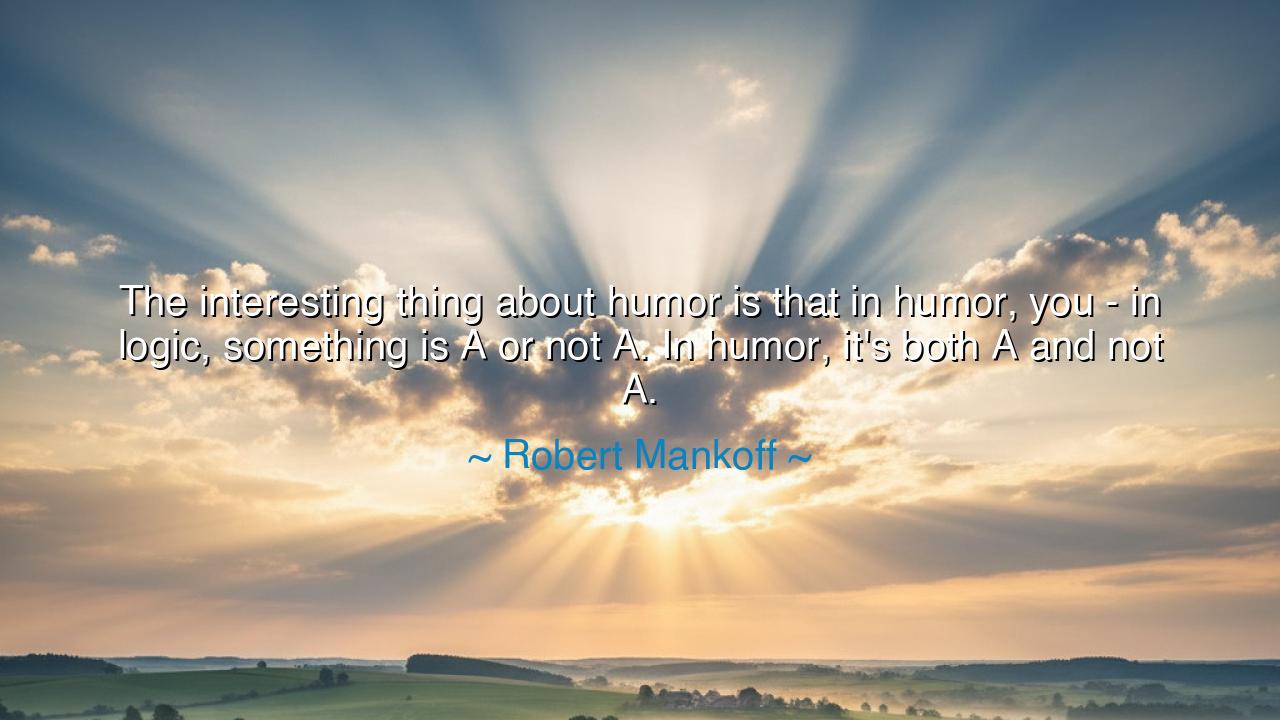
The interesting thing about humor is that in humor, you - in
The interesting thing about humor is that in humor, you - in logic, something is A or not A. In humor, it's both A and not A.






When Robert Mankoff said, “The interesting thing about humor is that in humor, you—in logic, something is A or not A. In humor, it’s both A and not A,” he unveiled a secret long known to philosophers, poets, and sages: that humor lives in paradox, in the space where opposites embrace rather than destroy each other. In the realm of logic, everything must be clear and absolute—a thing either is or is not. But in the realm of laughter, the soul finds freedom, for there, truth can be contradictory and yet complete. Humor, as Mankoff teaches, is not bound by the rigid walls of reason; it is born in the mysterious meeting of contradictions—where wisdom and foolishness, sorrow and joy, truth and absurdity intertwine.
The origin of this idea lies deep within the nature of the human spirit. From the dawn of civilization, people have sought to make sense of the world through logic, laws, and systems. Yet, life has always defied neat definition. The ancients discovered that reality is both tragic and comic, that it moves in spirals rather than straight lines. The Greek philosopher Heraclitus once said, “The path up and the path down are one and the same.” This is the essence of Mankoff’s insight: in humor, as in life, opposites coexist. When we laugh, we are acknowledging the paradox that the world is both foolish and profound, cruel and kind, meaningless and deeply meaningful.
Consider the story of Socrates, who spent his days unraveling the certainties of Athens through his relentless questioning. To many, he seemed foolish—mocking the arrogance of scholars and politicians with his feigned ignorance. Yet through that very foolishness, he revealed wisdom. Socrates understood, as Mankoff later would, that truth often hides behind contradiction. Humor, in this sense, is a form of enlightenment—it allows us to hold two opposing truths at once without despair. It is “A and not A”, and yet it still makes sense. That is why laughter can heal: it reconciles what the mind cannot.
To laugh is to stand between order and chaos, between certainty and mystery, and to say, “Yes, both can be true.” When we laugh, we admit the world’s absurdity without surrendering to it. A man slips on a banana peel—our logic says this is misfortune, yet our laughter transforms it into something else: a mirror of our own clumsiness, our shared fallibility. Humor allows us to accept what reason alone rejects—it turns pain into play, and contradiction into understanding. The mystics of old would call this unity through duality—the joining of opposites that leads to peace.
Even in the darkest moments of history, this paradoxical power of humor has saved souls. In the concentration camps of World War II, prisoners whispered jokes among themselves—not to deny their suffering, but to affirm their humanity. Viktor Frankl, a survivor, wrote that humor was “another of the soul’s weapons in the fight for self-preservation.” In those terrible places, humor became both A and not A—it was despair and hope, cruelty and courage. It could not change their fate, but it gave them the strength to endure it. Thus, Mankoff’s insight stretches far beyond laughter—it reveals humor as a force of survival, a way to hold onto meaning when logic collapses.
In this way, humor is divine. For the gods of old—whether in Olympus, in India, or in the heavens of Africa—were not solemn beings alone. They laughed. They played. They created and destroyed with equal joy. In laughter, humanity mirrors that divine paradox: the ability to see the infinite complexity of existence and still smile. Humor, therefore, is not the denial of reason, but its completion—it is the recognition that truth is too vast to fit within logic’s narrow bounds. It reminds us that the world is richer than our definitions, and that sometimes the deepest wisdom comes disguised as jest.
So, what lesson does Mankoff’s teaching offer to us? It is this: do not fear contradiction; embrace it. When life confuses you, when you cannot reconcile your hopes with your disappointments, remember that existence itself is both A and not A. Learn to laugh—not to escape, but to understand. For laughter loosens the grip of certainty, and in that loosening, the heart finds peace. To laugh wisely is to see the harmony hidden in opposites, to glimpse, if only for a moment, the divine play that underlies all things.
Thus, my listener, cultivate humor as you would cultivate wisdom. Let it guide you when logic fails. Let it soften your pain, illuminate your confusion, and humble your pride. Know that in every paradox—every failure, every triumph, every heartbreak—there is something to smile at, for the universe itself smiles through you. As Robert Mankoff taught, logic may divide, but humor unites. It is the bridge between reason and mystery, between the mind and the soul. And those who can laugh with understanding walk in harmony with the truth that life itself is both A and not A—and therein lies its beauty.






AAdministratorAdministrator
Welcome, honored guests. Please leave a comment, we will respond soon